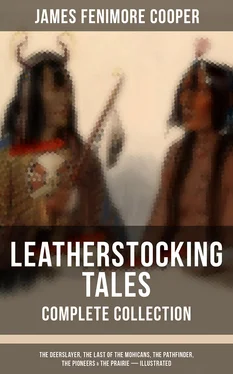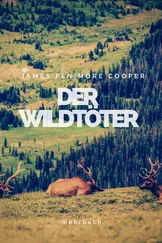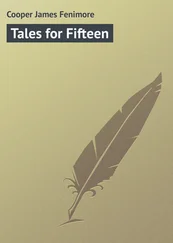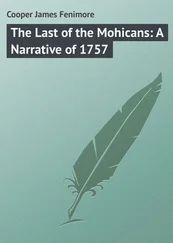Table of Contents
“Before these fields were shorn and tilled,
Full to the brim our rivers flowed;
The melody of waters filled
The fresh and boundless wood;
And torrents dashed, and rivulets played,
And fountains spouted in the shade.”
—Bryant
Leaving the unsuspecting Heyward and his confiding companions to penetrate still deeper into a forest that contained such treacherous inmates, we must use an author’s privilege, and shift the scene a few miles to the westward of the place where we have last seen them.
On that day, two men were lingering on the banks of a small but rapid stream, within an hour’s journey of the encampment of Webb, like those who awaited the appearance of an absent person, or the approach of some expected event. The vast canopy of woods spread itself to the margin of the river overhanging the water, and shadowing its dark current with a deeper hue. The rays of the sun were beginning to grow less fierce, and the intense heat of the day was lessened, as the cooler vapors of the springs and fountains rose above their leafy beds, and rested in the atmosphere. Still that breathing silence, which marks the drowsy sultriness of an American landscape in July, pervaded the secluded spot, interrupted only by the low voices of the men, the occasional and lazy tap of a woodpecker, the discordant cry of some gaudy jay, or a swelling on the ear, from the dull roar of a distant waterfall.
These feeble and broken sounds were, however, too familiar to the foresters, to draw their attention from the more interesting matter of their dialogue. While one of these loiterers showed the red skin and wild accoutrements of a native of the woods, the other exhibited, through the mask of his rude and nearly savage equipments, the brighter, though sunburnt and long-faded complexion of one who might claim descent from a European parentage. The former was seated on the end of a mossy log, in a posture that permitted him to heighten the effect of his earnest language, by the calm but expressive gestures of an Indian engaged in debate. His body, which was nearly naked, presented a terrific emblem of death, drawn in intermingled colors of white and black. His closely shaved head, on which no other hair than the well known and chivalrous scalping tuft5 was preserved, was without ornament of any kind, with the exception of a solitary eagle’s plume, that crossed his crown, and depended over the left shoulder. A tomahawk and scalping-knife, of English manufacture, were in his girdle; while a short military rifle, of that sort with which the policy of the whites armed their savage allies, lay carelessly across his bare and sinewy knee. The expanded chest, full formed limbs, and grave countenance of this warrior, would denote that he had reached the vigor of his days, though no symptoms of decay appeared to have yet weakened his manhood.
The frame of the white man, judging by such parts as were not concealed by his clothes, was like that of one who had known hardships and exertion from his earliest youth. His person, though muscular, was rather attenuated than full; but every nerve and muscle appeared strung and indurated by unremitted exposure and toil. He wore a hunting-shirt of forest green, fringed with faded yellow6 , and a summer cap of skins which had been shorn of their fur. He also bore a knife in a girdle of wampum, like that which confined the scanty garments of the Indian, but no tomahawk. His moccasins were ornamented after the gay fashion of the natives, while the only part of his under-dress which appeared below the hunting-frock, was a pair of buckskin leggings, that laced at the sides, and which were gartered above the knees with the sinews of a deer. A pouch and horn completed his personal accoutrements, though a rifle of great length7 , which the theory of the more ingenious whites had taught them was the most dangerous of all fire-arms, leaned against a neighboring sapling. The eye of the hunter, or scout, whichever he might be, was small, quick, keen, and restless, roving while he spoke, on every side of him, as if in quest of game, or distrusting the sudden approach of some lurking enemy. Notwithstanding the symptoms of habitual suspicion, his countenance was not only without guile, but at the moment at which he is introduced, it was charged with an expression of sturdy honesty.
“Even your traditions make the case in my favor, Chingachgook,” he said, speaking in the tongue which was known to all the natives who formerly inhabited the country between the Hudson and the Potomac, and of which we shall give a free translation for the benefit of the reader; endeavoring, at the same time, to preserve some of the peculiarities, both of the individual and of the language. “Your fathers came from the setting sun, crossed the big river,8 fought the people of the country, and took the land; and mine came from the red sky of the morning, over the salt lake, and did their work much after the fashion that had been set them by yours; then let God judge the matter between us, and friends spare their words!”
“My fathers fought with the naked redmen!” returned the Indian sternly, in the same language. “Is there no difference, Hawkeye, between the stone-headed arrow of the warrior, and the leaden bullet with which you kill?”
“There is reason in an Indian, though nature has made him with a red skin!” said the white man, shaking his head like one on whom such an appeal to his justice was not thrown away. For a moment he appeared to be conscious of having the worst of the argument, then, rallying again, he answered the objection of his antagonist in the best manner his limited information would allow: “I am no scholar, and I care not who knows it; but judging from what I have seen, at deer chases and squirrel hunts, of the sparks below, I should think a rifle in the hands of their grandfathers was not so dangerous as a hickory bow and a good flint-head might be, if drawn with Indian judgment, and sent by an Indian eye.”
“You have the story told by your fathers,” returned the other, coldly waving his hand. “What say your old men? do they tell the young warriors, that the pale-faces met the redmen, painted for war and armed with the stone hatchet and wooden gun?”
“I am not a prejudiced man, nor one who vaunts himself on his natural privileges, though the worst enemy I have on earth, and he is an Iroquois, daren’t deny that I am genuine white,” the scout replied, surveying, with secret satisfaction, the faded color of his bony and sinewy hand; “and I am willing to own that my people have many ways, of which, as an honest man, I can’t approve. It is one of their customs to write in books what they have done and seen, instead of telling them in their villages, where the lie can be given to the face of a cowardly boaster, and the brave soldier can call on his comrades to witness for the truth of his words. In consequence of this bad fashion, a man who is too conscientious to misspend his days among the women, in learning the names of black marks, may never hear of the deeds of his fathers, nor feel a pride in striving to outdo them. For myself, I conclude the Bumppos could shoot, for I have a natural turn with a rifle, which must have been handed down from generation to generation, as, our holy commandments tell us, all good and evil gifts are bestowed; though I should be loth to answer for other people in such a matter. But every story has its two sides; so I ask you, Chingachgook, what passed, according to the traditions of the redmen, when our fathers first met?”
A silence of a minute succeeded, during which the Indian sat mute; then, full of the dignity of his office, he commenced his brief tale, with a solemnity that served to heighten its appearance of truth.
“Listen, Hawkeye, and your ear shall drink no lie. ’Tis what my fathers have said, and what the Mohicans have done.” He hesitated a single instant, and bending a cautious glance toward his companion, he continued, in a manner that was divided between interrogation and assertion, “Does not this stream at our feet run towards the summer, until its waters grow salt, and the current flows upward?”
Читать дальше












